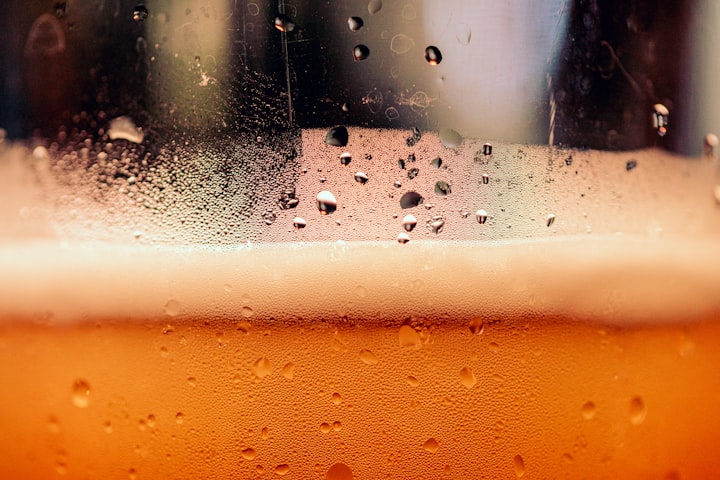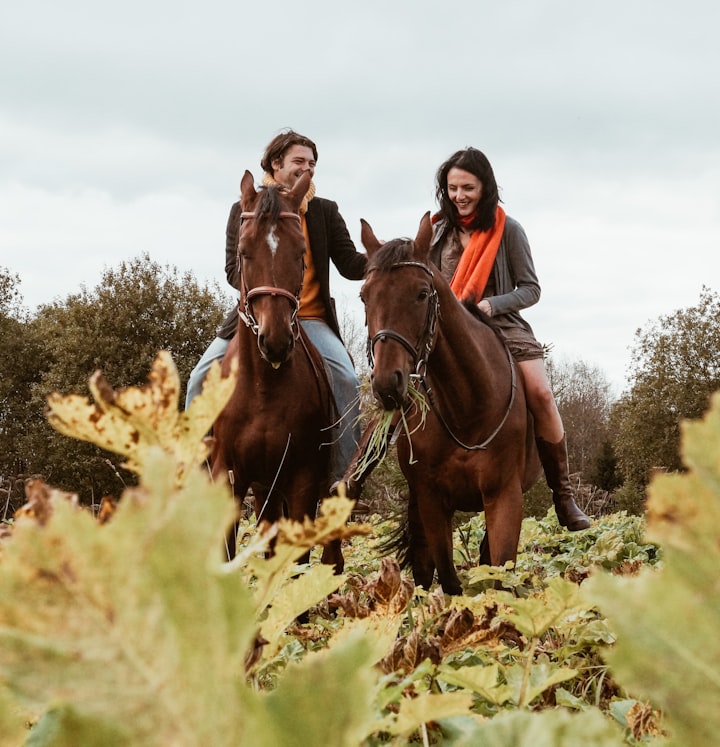Don't worry, be happy
You only get one ticket on the train of life.

It’s over a decade since my father died. And about him, I remember the fun things, the wonderful things, the absurd and the intimate. His moustache, the fish-shaped birthmark on his left cheek. The way he’d laugh until he coughed and cried, watching Yes Minister on the ABC. His penchant for platitudes: That’s just the way the cookie crumbles, he’d say.
My father had an enthusiastic, irreligious love of Christmas. Embracing the festive season had nothing to do with the birth of Jesus; it was the festivities he loved. (My childhood was flavoured by cultural Catholicism from my mother’s side. If he came to Mass, Dad was always asleep before the homily. If he’d been forced to choose a religion, it would have been the Australian Football League, Essendon Football Club Chapter, a team he worshipped with ritual fervour every Saturday from March to September.) He loved a proper pine Christmas tree, which he’d spend hours trimming so it would stand up straight, balanced in an old wooden pail he’d polished for the purpose. The Christmas family tradition of a t-shirt competition (a slogan or a joke, hand-drawn onto a white t-shirt, the funniest wins) started with Dad. He even made a trophy for it, which exists to this day: a toy train mounted on a board with little brass plaques for the winners’ names, and another of his favourite sayings – You only get one ticket on the train of life. You might as well enjoy the ride. One of my most treasured photographs is of Dad wearing foam reindeer antlers and a lab coat (why? who knows?), sitting on a deck chair in a blow-up paddle pool, playing chess with my brother on a stinking hot Christmas Day.
In the small country town I grew up in, nestled into the south-west corner of Victoria (on unceded Gunditjmara land), Dad was well-known as a larrikin. He knew everyone's names – the local cops, the publican, the butcher, the grocer. He did favours for blokes he knew, such as hiding a hunting rifle in a cupboard in our living room while his mate sorted out the licence. And the favours came around. Our first VCR was from 'a bloke I know' and may have 'fallen off the back of a truck'. It was best not to ask too many questions.
At the end of his funeral, we played one of his favourite songs: Don’t Worry, Be Happy. It seems incongruous for a funeral – and I admit now that it was a brave choice – but it summed up the attitude to life that he’d always tried to instil in us. He valued contentment above all else.
These memories are precious, but of course, they are incomplete, one-sided. It’s human nature to sanctify our dead loved ones, to filter out the things we find hard to reconcile. There are darker sides to every personality. Dad was not perfect, not by any stretch. I can revise every memory of him by adding in the one detail I would rather gloss over: in almost all, he’s holding a beer.
My father was a drinker.
He drank beer every night. With dinner, in front of the television, after work, after playing golf. With friends at the pub. He drank beer in the carpark at school functions, at the local footy on weekends. The ritual drinking of beer was a full-time occupation, interfered with by work and, I realise now, his family time. He wasn’t a drunk, not in the way I would have understood it back then. He was clumsy at times, but never violent. It was common for him to fall asleep in his chair at night, in front of the television. I assumed he was tired. When I was in primary school, he lost his licence for drink driving; my mother had to drive us to school. We never thought much of it, and if we did, it was to laugh. As kids, it amused us to sneak a swig of his beer when he wasn’t looking.
To call him an alcoholic hurts me. It’s physically painful to label him with a word that reeks of judgement and shame, of weakness, of moral failure. To say aloud, My father was an alcoholic, is not cathartic in the way it might be to admit my own flaws. I’m ashamed at how much I wish I could deny it. I don’t want the stench of it to rub off on me, but it’s true. He drank persistently from his late teens through to his fifties, when the effects on his health forced him to stop; but the damage to his liver and his gastrointestinal tract was done.
He died because of his alcoholism, although it was years after he’d stopped drinking. He developed abdominal pain. His doctor took one look at him and sent him to hospital, where he promptly collapsed in the waiting room before he was even triaged. He died, a few days later, from liver failure and bleeding oesophageal varices. It was an unpleasant, delirious, jaundiced death. The moaning man in that hospital bed bore no resemblance to the funny man who’d played chess in a paddle pool a few years earlier.
It’s taken me time to process the events surrounding his death, and even more time to come to grips with his life. Because what I’ve realised is that he lied to me, to all of us. He said, Don’t worry, be happy – but he wasn’t. His contentment was a façade, achieved only after a few beers. No one who is an addict, an alcoholic, is genuinely happy.
Addiction is complicated. It’s not a choice or a habit, although choices and habits play into it every day. It has a cause, a combination of genetic, social, mental and physical factors. I’ll never know an exact reason for my father’s alcoholism: was it deep-seated unhappiness that his drinking numbed? Was it genetic? Or was there anxiety, a lack of close friendships among countless superficial ones, a past trauma unresolved? Was it the vague existential angst we all dabble with at times?
There is a fascinating disconnect between the facts about alcohol consumption and our cultural acceptance of it. We know that there is a definite limit to safe consumption. We know that alcohol causes, or contributes to, at least seven different kinds of cancers, including biggies like breast and bowel cancer. We know it causes liver disease and dementia. There are few other poisonous, carcinogenic substances that we’re as willing to ingest as alcohol. And I haven’t even touched on the tragic cost of violence and road trauma.
But we – I – rationalise it, brilliantly so, like expert debaters taking on the affirmative and talking loudly over the negative side. Alcohol has been part of human culture forever, we say. Fermentation of sugars to ethanol is a natural phenomenon. A good wine complements a fine meal, a cocktail makes a party. We see the glamour, the grown-upness, the sweetness, the fun. We don’t want to live in a nanny-state where we’re treated like children. And the dose makes the poison; so long as we stick to limits, we’re fine. We can have a drink or two and we’re okay with that…right?
Examining my relationship with the poison that killed my father has been difficult. What started as a quiet voice of warning now clamours for attention. I enjoy a glass of wine or a fancy craft gin with a slice of lime. These are sophisticated drinks, an adult indulgence. But what am I really enjoying? Is it the taste, or is it the relaxant effect, calming my stress levels – and if so, is that the best I can do? There are far healthier ways to manage stress. In my younger years, I know I drank too much. Back then, weekend binge-drinking was an accepted part of emerging adulthood for Australian teenagers. It was considered fun, normal, sociable. But the reality hurts, almost as much as facing the label my father wore; it wasn’t just for fun. It was to calm the social anxiety and fit in with the crowd. Instant extroversion, a social lubricant.
And here’s the rub: even knowing all of this, I still want to defend my right to my glass of wine. What I’ve decided is that the best way to follow Dad’s mantra – Don’t worry, be happy – is to be honest with myself when I’m decide to have a drink, and especially if I have two or three. The best way to honour his memory is to learn from the lessons he taught us, whether he meant to or not.
About the Creator
Tanya Scott
Hello from the beautiful surf coast of Victoria, Australia! I'm a GP and medical educator and I write to make sense of the world.
Reader insights
Outstanding
Excellent work. Looking forward to reading more!
Top insights
Heartfelt and relatable
The story invoked strong personal emotions
Easy to read and follow
Well-structured & engaging content
Excellent storytelling
Original narrative & well developed characters
Compelling and original writing
Creative use of language & vocab
Eye opening
Niche topic & fresh perspectives
Masterful proofreading
Zero grammar & spelling mistakes
On-point and relevant
Writing reflected the title & theme






Comments (3)
Thank you for being brave and sharing this personal and vulnerable story with us, Tanya. It was also brave of you to talk about your own relationship with alcohol, which I think we fail to do because it is deeply embedded in our culture. The memories you share of your father are the best ones to keep. 🥰
Thank you for sharing this piece, Tanya. I think we can all relate to it living in a country with such a heavy drinking culture. You story makes me consider my own relationship with alcohol, and how over the years I've "needed" it as that lubricant for social anxiety, as you so well describe. These days, I try to prescribe to a mantra from my own Dad when it comes to alcohol: If you want one, have one. If you *need* one, don't.
Beautiful piece, Tanya! I enjoyed the way you drew me in as a reader. You provided great sensory details of not only the joyful side of your father's life but also the hard, personal side that not many people get to see. Well done for having the courage to write and share what would have been a difficult piece for you.💞😊